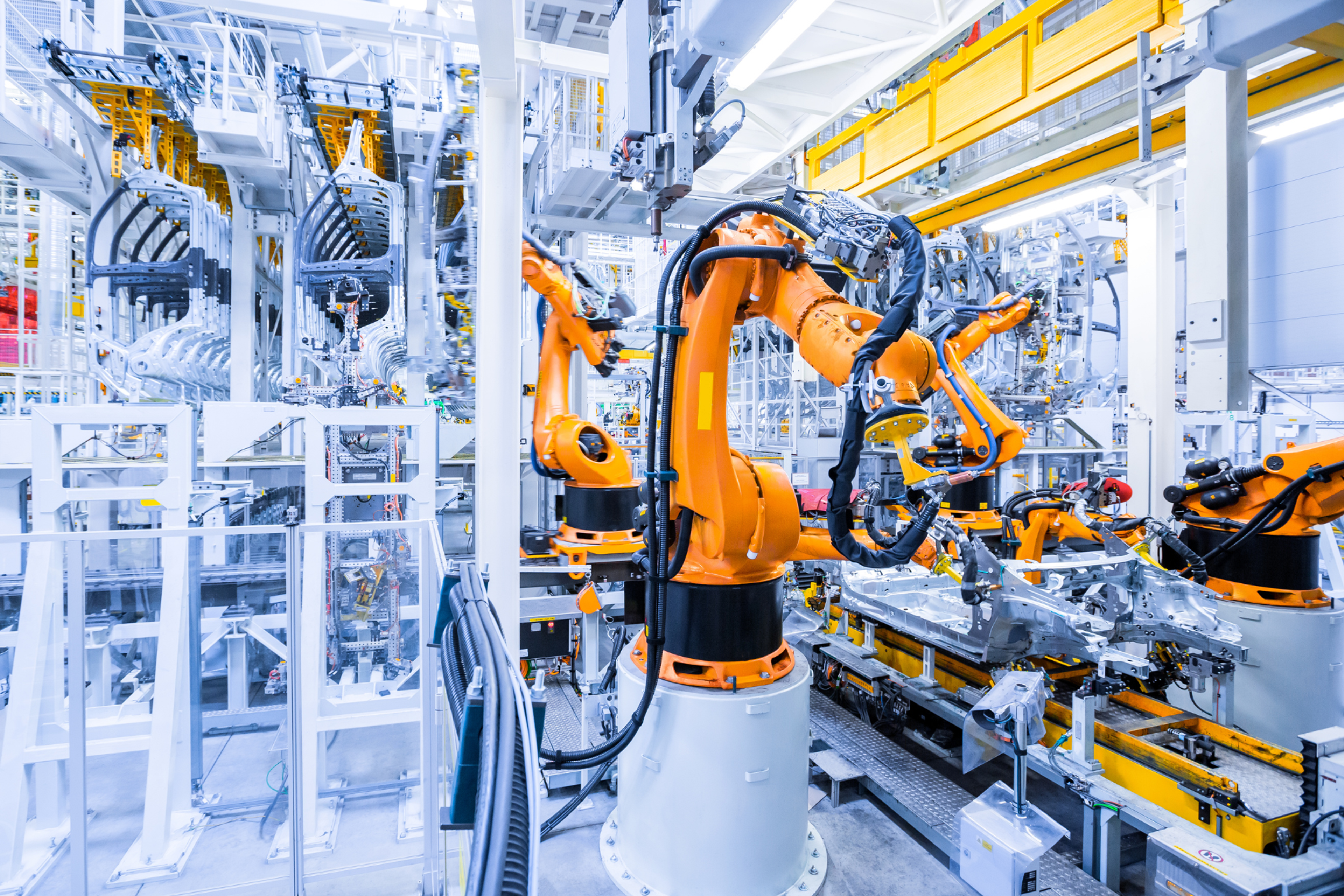The Top 10 Private Equity Firms for Manufacturing
Discover the top 10 private equity firms that specialize in manufacturing.
Posted June 19, 2025

Join a free event
Learn from top coaches and industry experts in live, interactive sessions you can join for free.
Table of Contents
Private Equity & the Manufacturing Industry
What is Manufacturing?
Manufacturing involves the production of goods using labor, machines, tools, and chemical or biological processing. It spans a vast array of sectors, from automotive and electronics to textiles and food products. Central to modern manufacturing is the integration of technology and automation, which enhances efficiency and output quality.
One of the most transformative trends in modern manufacturing is the adoption of Industry 4.0 technologies. These include robotics, Internet of Things (IoT), artificial intelligence, and 3D printing, which collectively optimize production processes, improve product customization, and reduce waste. Such advancements not only increase productivity but also enable manufacturers to respond more flexibly to market demands and environmental concerns.
Private Equity Activity in Manufacturing
Private equity firms invest in manufacturing companies across various stages of their lifecycle, often targeting those in need of capital for expansion or technological upgrades. These investments can significantly enhance operational efficiencies and market reach, ultimately driving profitability.
PE firms contribute more than just capital. They often bring sector-specific expertise and operational experience, helping firms streamline operations, innovate product lines, and expand into new markets. This includes implementing modern manufacturing practices and technologies that may be financially out of reach without external funding.
As global markets evolve and consumer demands shift, private equity has become increasingly interested in the manufacturing sector. This interest is driven by the potential for significant returns from firms that successfully adapt to technological advancements and changing market dynamics.
For deep dives into other specialized PE funds, see the top PE firms for biotechnology, healthcare, oil and gas, and construction.
The Top 10 Private Equity Firms for Manufacturing
Now, we'll dive into the top 10 private equity firms specializing in the manufacturing sector, outline their AUMs, portfolio companies, and more.
1. TA Associates Management
- Founded: 1968
- Headquarters:
- Boston, Massachusetts
- Menlo Park, California
- Austin, Texas
- London, United Kingdom
- Mumbai, India
- Hong Kong
- Total AUM: $41.5 billion
- Sample Portfolio Companies:
With over 50 years of proven track record of success, TA Associates Management is a prominent global private equity firm. Having raised $65 billion in capital and completed over 560 investments, including more than 970 portfolio company acquisitions, TA specializes in driving growth and profitability in various industries. Their focus areas include technology, financial services, healthcare, consumer, and business services. Whether serving as a minority or majority investor, TA fosters collaborative relationships with management teams and stakeholders to enhance businesses and create lasting value. Leveraging their extensive experience and strategic capabilities, TA is committed to helping companies scale growth and improve performance, making them a trusted partner in the world of private equity.
2. KPS Capital Partners
- Founded: 1991
- Headquarters:
- New York, New York
- Chicago, Illinois
- Frankfurt, Germany
- Amsterdam, Netherlands
- Total AUM: $21.4 billion
- Sample Portfolio Companies:
KPS Capital Partners specializes in making controlling equity investments in a wide range of global manufacturing and industrial companies spanning various industries such as basic materials, branded consumer goods, healthcare, luxury products, automotive parts, capital equipment, and general manufacturing. They have a unique approach of creating new companies to acquire assets or businesses from large corporations, family-owned enterprises, or those undergoing financial restructurings. KPS aims to revitalize these businesses, transforming them into independent, resilient, and industry-leading enterprises through strategic investments and operational enhancements.
3. LFM Capital
- Founded: 2014
- Headquarters: Nashville, Tennessee
- Total AUM: $879.0 million
- Sample Portfolio Companies:
LFM Capital is a private equity firm founded by operators and engineers, specializing in investments in manufacturing companies across the United States and Canada. Committed to fostering long-term partnerships with management teams and investors, LFM Capital endeavors to deliver industry-leading returns by prioritizing operational excellence. Recognizing the pivotal role of sales, marketing, product development, supply chain management, distribution, and manufacturing in achieving success, they collaborate closely with companies to identify growth opportunities. Together, they strategize on pulling the right levers to drive growth and maximize potential, embodying a collaborative approach to investment and operational enhancement.
4. Highlander Partners
- Founded: 2004
- Headquarters:
- Dallas, Texas
- Total AUM: over $3 billion
- Sample Portfolio Companies:
Highlander Partners engages in a diverse array of investments across various asset categories, primarily concentrating on majority control, direct private equity investments. Their team comprises seasoned investment professionals as well as accomplished builders and operators with extensive experience in a wide spectrum of industries. Drawing from their wealth of experiences, Highlander is adept at comprehending the intricacies of each company's business, enabling them to focus on strategic initiatives rather than allocating time to familiarizing themselves with the operations. This collaborative approach fosters a partnership dynamic aimed at driving sustainable growth and success.
5. Argonaut Private Equity
- Founded: 2002
- Headquarters: Tulsa, Oklahoma
- Total AUM: $2.9 billion
- Sample Portfolio Companies:
Argonaut Private Equity has carved a niche for itself in the manufacturing sector. With a strong track record of successful investments and strategic partnerships, Argonaut specializes in providing growth capital and operational support to manufacturing businesses. Their tailored approach and hands-on involvement have earned them a reputation for driving value creation and fostering long-term growth. Backed by a team of experienced professionals and industry experts, Argonaut is committed to helping manufacturing companies thrive in today's dynamic market landscape. As one of the top private equity firms for manufacturing, Argonaut stands out for its strategic vision, operational expertise, and dedication to delivering results for its portfolio companies.
6. Graham Partners
- Founded: 1988
- Headquarters: Newtown Square, Pennsylvania
- Total AUM: $5.2 billion
- Sample Portfolio Companies:
Graham Partners strives to invest in market-leading private businesses that spur innovation in industrial technologies and advanced manufacturing. Since its founding in 1988, Graham Partners has focused on industrial technology and advanced manufacturing businesses with deep engineering resources capable of leveraging advances in materials science and production technologies to maximize growth potential. With over 150 acquisitions and investments to date, Graham Partners works closely with its team of over 60 operating executives to provide hands-on resources to portfolio company management teams, enhancing product development capabilities and catalyzing revenue growth. This collaborative approach aims to accelerate product development and top-line growth, ensuring sustainable success for its portfolio companies.
7. JLL Partners
- Founded: 1988
- Headquarters: New York, New York
- Total AUM: $3.4 billion
- Sample Portfolio Companies:
In over 30 years, JLL Partners has solidified its reputation as a leading private equity firm. With $5.8 billion invested and over 250 total acquisitions, JLL employs a proven and repeatable approach to business building. They leverage their extensive track record of successful partnerships, tailoring strategies to meet the unique needs of each portfolio company. JLL works closely with management teams to drive growth, implementing organic growth initiatives, operational enhancements, and strategically planned M&A activities to elevate businesses to new heights.
8. The Carlyle Group
- Founded: 1987
- Headquarters: Washington, DC
- Total AUM: $425 billion
- Sample Portfolio Companies:
The Carlyle Group stands as a global powerhouse in the realm of private equity, boasting 28 offices spanning four continents and a team of over 2,200 professionals worldwide. Leveraging this extensive network, they harness their collective expertise to enact positive change across diverse industries. Managing a staggering $425 billion in assets through 595 investment vehicles across three business segments, Carlyle prides itself on prudent and responsible investment practices geared towards long-term success. Their approach revolves around building better businesses, drawing upon their global platform, local insights, and profound industry knowledge to drive innovation and sustainable growth.
9. ShoreView Industries
- Founded: 2002
- Headquarters: Minneapolis, Minnesota
- Total AUM: $973 million
- Sample Portfolio Companies:
ShoreView boasts an impressive track record spanning over two decades, with a commitment of $1.3 billion in capital and over 100 add-on acquisitions. Specializing in partnering with family and entrepreneur-owned businesses, ShoreView prioritizes long-term, stable growth for its investments. By providing capital and collaborating closely with company owners and managers, ShoreView facilitates various strategic objectives. These include unlocking value created by current owners, fostering management development and succession planning, pursuing add-on acquisitions, and fueling organic growth initiatives. With a proactive and partnership-driven approach, ShoreView endeavors to drive sustainable growth and maximize value for its portfolio companies.
10. Align Capital Partners
- Founded: 2016
- Headquarters:
- Dallas, Texas
- Cleveland, Ohio
- Total AUM: $1.5 billion
- Sample Portfolio Companies:
Align Capital Partners focuses on strategic partnerships and operational improvements. Align Capital Partners has a proven track record of driving growth and creating value. Leveraging their industry expertise and collaborative approach, they work closely with manufacturing companies to unlock potential and achieve long-term success. As one of the top private equity firms for manufacturing, Align Capital Partners is committed to delivering results and supporting the growth of their portfolio companies.
Land a Private Equity Job With the Help of an Expert
Private equity experts offer valuable insights, guidance, and connections that can help you navigate the competitive landscape of the industry. Whether you're a recent graduate looking to break into the field or an experienced professional seeking advancement, top private equity coaches can provide you with the tools, support, and the right expert you need to achieve your career goals.
Read these articles next:
- Private Equity Roles: The Different Career Paths
- 10 Essential Steps to Getting Into Private Equity
- 10 Finance Internships for Freshmen in College
FAQs
What are the Big 4 private equity firms?
- The Big Four — Apollo Global Management Inc., Blackstone Inc., The Carlyle Group Inc., and KKR & Co. Inc. — are the largest publicly-traded alternative asset managers by assets under management.
What is the most successful private equity firm?
- Blackstone Inc. ( ticker: BX) $124 billion.
- KKR & Co. Inc. ( KKR) ...
- EQT AB (OTC: EQBBF) $99.1 billion.
- CVC Capital Partners PLC (CVCA.XD) $77.6 billion.
- TPG Inc. ( TPG) $61.9 billion.
- Carlyle Group Inc. ( CG) $60.2 billion.
- Thoma Bravo LP. $59.1 billion.
- Advent International LP. $52.9 billion.
What is the highest-paying private equity firm?
- Apollo Global Management is one of the top private equity firms, renowned for its high compensation rates. With $631 billion in assets under management, Apollo offers competitive salaries and bonus ranges for their employees. Managing directors at Apollo can expect a total compensation ranging from $350,000 to $500,000.
Who raises money for private equity firms?
- Capital for acquisitions comes from outside investors in the private equity funds the firms establish and manage, usually supplemented by debt. Some or all of the debt is often placed on the balance sheet of the company being acquired.
What is the highest position in private equity?
- Managing Director (MD)
- Partner Or Managing Director (MD)
Browse hundreds of expert coaches
Leland coaches have helped thousands of people achieve their goals. A dedicated mentor can make all the difference.





















